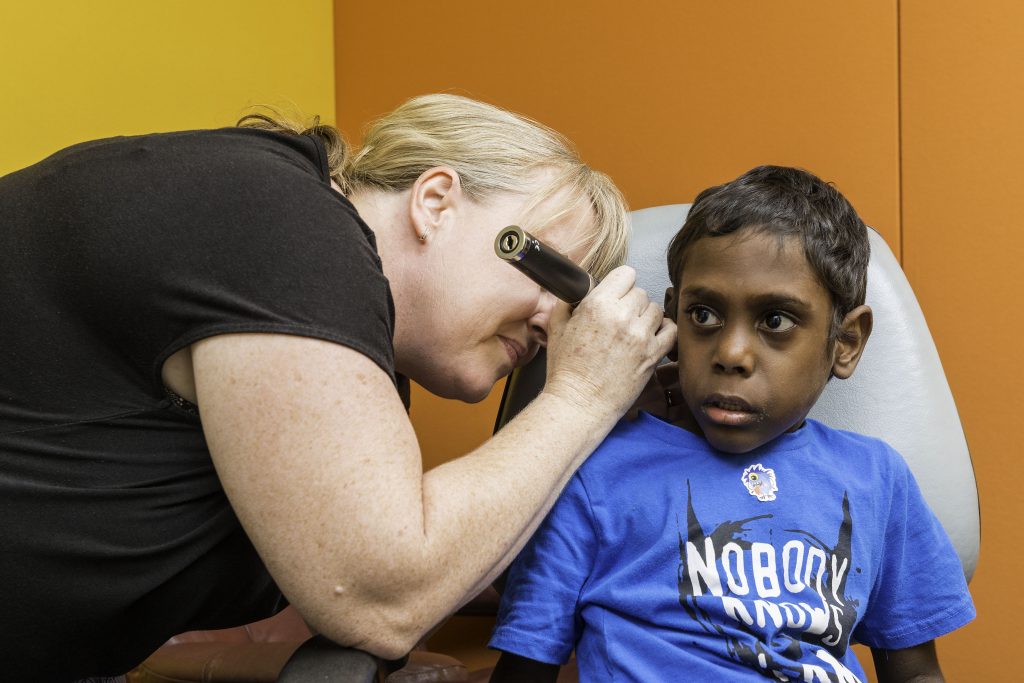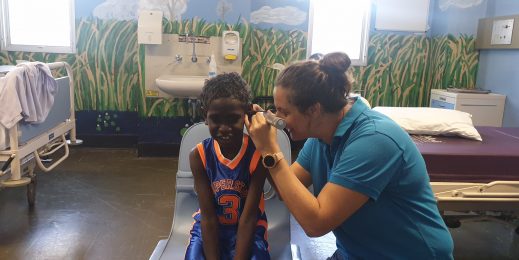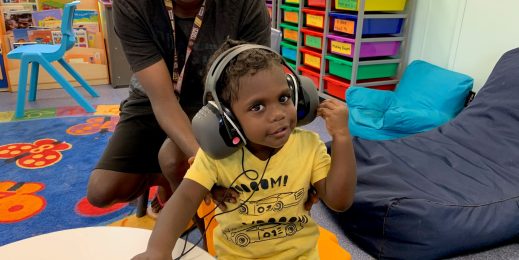
DrumBeat.ai heralds new era in ear health for rural and remote Indigenous Australian children with AI-infused cloud
Microsoft AI for Good supports landmark innovation
Microsoft is delighted to support the DrumBeat.ai project, a world-leading initiative using artificial intelligence and the Azure cloud to enhance the recognition of ear disease in rural and remote areas of Australia. The overarching objective of the DrumBeat.ai project is to develop an image classification algorithm to autonomously analyse eardrum images to improve triage, treatment and specialist referral of Aboriginal and Torres Strait Island children at risk of hearing loss.
Aboriginal and Torres Strait Island children are three times more likely to suffer from otitis media (middle ear infections) and twice as likely to have long-term hearing problems than non-Indigenous children in Australia.1 If left unchecked, ear disease can have devastating impacts throughout a child’s life.4 The prevalence of chronic ear disease in such children is nearly ten times greater than the level which the World Health Organisation (WHO) considers a massive public health problem, requiring urgent attention.5
Recurrent middle ear infections, “glue ear” (otitis media with effusion) or runny ears (chronic suppurative otitis media) can lead to permanent hearing loss or deafness. Being unable to hear properly can drastically affect a child’s ability to develop speech and language skills, learn and interact with family and friends. It can contribute to behavioural problems and limit future employment opportunities – leading to lifelong challenges.

But limited access to Ear, Nose and Throat (E.N.T.) specialists is a real challenge for communities – especially for Aboriginal and Torres Strait Islander children in rural and remote areas. On the frontline in rural and remote areas, most ear exams are completed by local community health workers who can look inside a child’s ear with an ear camera (otoscope). However, eardrum photos are difficult to interpret and frontline health workers do not have the specialist medical training required to accurately diagnose and treat ear disease.
DrumBeat.ai is a ground-breaking project exploring how artificial intelligence and cloud computing can be used to autonomously interpret eardrum photos.
Dr Al-Rahim Habib, an Ear, Nose and Throat Surgery Unaccredited Registrar and a PhD candidate at the University of Sydney, leads the DrumBeat.ai project supervised by Associate Professor Narinder Singh, Head of ENT at Westmead Hospital and a clinical academic at the University of Sydney. The aim of the DrumBeat.ai project is to empower frontline health workers to quickly recognise at-risk children and initiate early triage, treatment, and referrals to specialists.
According to Dr Habib; “We’re creating a tool that can be used by a health worker to recognise ear disease, show whether a child is going to develop hearing loss, and how urgently they need to be referred to an Ear, Nose and Throat surgeon.
“We envision this tool being deployed into rural and remote settings where a primary care practitioner, nurse, or community health worker with limited information can look inside the ear, and instantly get an idea of how severe the child’s ear is, and then make a referral or treatment plan based on urgency. We feel this technology can revolutionise how ear disease is managed.”
The system is currently being trialled in the Northern Territory at the Royal Darwin Hospital and the Deadly Ears Program in Queensland.
Associate Professor Narinder Singh, chief investigator on Drumbeat.ai said; “Having grown up on my family’s farm in Griffith, country NSW, I have first-hand experience of the difficulty in accessing timely healthcare in the bush. Any program that accelerates the speed at which at-risk children can be treated can have a huge impact for patients, care providers and the community.
By melding clinical expertise with modern digital technologies and AI, Drumbeat.ai is empowering front line health workers and ensuring Indigenous children with hearing disease can be treated swiftly, helping to reduce the risks of ongoing problems that can arise as a result of hearing loss. We’re bringing world-leading tech and Aussie ingenuity to the Outback”
The Microsoft Azure based platform uses Azure Custom Vision and machine learning to train itself using nearly 20,000 existing otoscopic eardrum images, collected from the Royal Darwin Hospital and Deadly Ears Program. In its early phase, the DrumBeat.ai algorithm can distinguish between normal or abnormal eardrums with a precision and recall over 85% depending on the complexity of the ear condition. It is expected the classification accuracy will rise as the algorithm continues to be fine-tuned and more images are analysed.
According to Dr Habib; “The otoscopic eardrum images used in this project have been collected over the past ten years, which has given us a data source that is unique to the entire world. We are very fortunate to access this data and to have the opportunity to address an important public health need.”
Dr Hemi Patel, a Northern Territory Ear Nose and Throat Surgeon who has been instrumental in establishing the image database said; Data is the key to any diagnosis. Drumbeat.ai has used an existing and world-class collection of analysed images to refine and train its model to be able to identify abnormal eardrum images with a high degree of accuracy, and to then triage patients for treatment. As this work proceeds our knowledge and data collection will expand, and that in turn will allow further refinement of the model leading to even better outcomes over time.”
Dr Nic Woods, health industry executive at Microsoft Australia and New Zealand, said DrumBeat.ai is an example of how AI infused digital platforms and telemedicine can accelerate diagnosis and opportunities for treatment.
“Microsoft is delighted to support Dr Habib and the DrumBeat.ai team in this important work with access to our Azure Fast Track engineering experts and an AI for Good grant.
“The pandemic has accelerated digital health initiatives across the world, and demonstrated the power of telemedicine. DrumBeat.ai takes this to the next level infusing AI in order to interpret images and ensure that those in need receive the medical attention they need to ensure long and healthy lives.”
DrumBeat.ai takes this to the next level infusing AI in order to interpret images and ensure that those in need receive the medical attention they need to ensure long and healthy lives.
Dr Habib says similar ear health problems exist overseas especially in regions such as India, sub-Saharan Africa and among First Nations people in the US and Canada. As the platform is based on Azure which has a global footprint, it should be possible to make the system available internationally in the future.
About Microsoft
Microsoft (Nasdaq “MSFT” @microsoft) enables digital transformation for the era of an intelligent cloud and an intelligent edge. Its mission is to empower every person and every organisation on the planet to achieve more.
For media enquiries, please contact:
Rudolf Wagenaar, Commercial Communications Lead, Microsoft Australia
Email: [email protected]
Mobile: 043 908 2550








